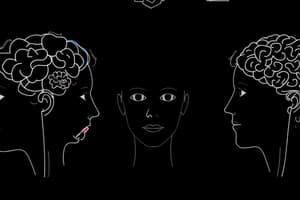Podcast
Questions and Answers
Which factor is NOT associated with academic ability according to the provided information?
Which factor is NOT associated with academic ability according to the provided information?
What does postformal thought suggest about truth?
What does postformal thought suggest about truth?
In the context of decision-making, older adults tend to:
In the context of decision-making, older adults tend to:
Which type of reasoning is characterized by changing one's thoughts to better approximate the world of experience?
Which type of reasoning is characterized by changing one's thoughts to better approximate the world of experience?
Signup and view all the answers
Which of the following describes a common cognitive approach in reflective judgment?
Which of the following describes a common cognitive approach in reflective judgment?
Signup and view all the answers
What distinguishes wisdom from general knowledge?
What distinguishes wisdom from general knowledge?
Signup and view all the answers
Which of the following is NOT a component of the Common Wisdom Model?
Which of the following is NOT a component of the Common Wisdom Model?
Signup and view all the answers
How do older adults typically vary their problem-solving approaches?
How do older adults typically vary their problem-solving approaches?
Signup and view all the answers
In the scenario presented, what is the moral dilemma faced by the individual?
In the scenario presented, what is the moral dilemma faced by the individual?
Signup and view all the answers
What aspect of wisdom is highlighted by the integration of opinions and compromise?
What aspect of wisdom is highlighted by the integration of opinions and compromise?
Signup and view all the answers
What happens to neuroticism as individuals grow older?
What happens to neuroticism as individuals grow older?
Signup and view all the answers
Which dispositional trait shows a slight increase with age?
Which dispositional trait shows a slight increase with age?
Signup and view all the answers
What aspect of personality is described as giving a person a sense of self or identity?
What aspect of personality is described as giving a person a sense of self or identity?
Signup and view all the answers
According to the Five-Factor Model, which trait is expected to increase up to age 70?
According to the Five-Factor Model, which trait is expected to increase up to age 70?
Signup and view all the answers
Which term describes the developmental changes in personality concerning their adaptive value?
Which term describes the developmental changes in personality concerning their adaptive value?
Signup and view all the answers
What is the focus of 'personal concerns' in personality analysis?
What is the focus of 'personal concerns' in personality analysis?
Signup and view all the answers
What describes the ideal end states associated with personality according to the content?
What describes the ideal end states associated with personality according to the content?
Signup and view all the answers
Which of the following traits is estimated to decrease slightly with age?
Which of the following traits is estimated to decrease slightly with age?
Signup and view all the answers
What is the primary characteristic of dispositional traits?
What is the primary characteristic of dispositional traits?
Signup and view all the answers
Which researchers contributed to the theory of the Five-Factor Model?
Which researchers contributed to the theory of the Five-Factor Model?
Signup and view all the answers
Study Notes
Intellectual Abilities
- Academic ability is linked to higher wages.
- Low IQ is associated with increased antisocial behavior and a higher risk of developing mental disorders.
- However, IQ is not related to life satisfaction or marital happiness.
Moderators of Intellectual Change
- Cohort differences, information processing, socialcultural and lifestyle variables, personality, and health can influence intellectual change.
Differences in Thinking
-
Piaget's Theory of Adaptation:
- Assimilation: Applying existing knowledge to understand new information.
- Accommodation: Modifying existing knowledge to better represent the world.
-
Postformal Thought:
- Acknowledges that truth can vary based on context.
- Emphasizes the need for realistic solutions.
- Recognizes the inherent ambiguity and contradiction in life.
- Highlights the role of emotions and subjective factors in thinking.
-
Reflective Judgment:
- Prereflective Reasoning: Knowledge seen as absolute, with no need for justification.
- Quasi-Reflective Reasoning: Acknowledges uncertainty, but relies on personal opinions.
- Reflective Reasoning: Recognizes the provisional nature of knowledge and seeks evidence-based solutions.
Everyday Reasoning
-
Decision Making:
- Older adults tend to seek less information for decision-making and rely more on accessible information.
- They often avoid taking risks.
- Age differences in decision-making are smaller when relying on crystallized intelligence (knowledge and experience).
-
Problem Solving:
- Older adults are more likely to adjust their problem-solving strategies based on the specific challenge.
- For instance, they often employ more emotion-regulation strategies in interpersonal conflicts.
Wisdom
- Definition: Integrated and distilled understanding derived from life experience.
- Characteristics: Expertise in fundamental life pragmatics, dealing with important life matters, possessing superior knowledge, judgment, and advice, being well-intended, and combining mind and virtue.
- Key Components: Pragmatic, epistemic, and better recognized by peers than by oneself.
-
Consensus/Common Wisdom Model:
- Metacognition: Intellectual humility, recognizing multiple perspectives and contexts, acknowledging uncertainty and change, integrating opinions and compromise.
- Moral Aspirations and Cultural Contexts: Wisdom is grounded in these factors.
- Aging and Wisdom: Wisdom generally increases with age but not guaranteed.
Personality
- Dispositional Traits: Consistent personality characteristics that can be measured across individuals.
- Personal Concerns: Things that are important to individuals, their goals, and life concerns.
- Life Narrative: The integrated story of oneself, including identity and sense of self.
The Five-Factor Model of Personality
- Neuroticism: Tends to slightly decrease, especially in women.
- Extraversion: Slightly decreases.
- Openness to Experience: Slightly decreases.
- Agreeableness: Slightly increases.
- Conscientiousness: Increases up to age 70.
Personality Changes Throughout Adulthood
- Personality Adjustment: Developmental changes that improve adaptive value and functionality.
- Personality Growth: Ideal end states such as increased self-transcendence, wisdom, and integrity.
Personal Concerns
- Contextualized: Personal concerns are shaped by specific life circumstances.
- Narrative Descriptions: They involve stories and are not objective measures.
- Change Over Time: Personal concerns shift throughout adulthood.
Erikson's Stages of Psychosocial Development
- Each stage represents a major life struggle.
- Epigenetic Principle: Each stage needs to be resolved to move to the next.
- Generativity vs. Stagnation: A key stage in adulthood where individuals either contribute to society or become self-absorbed.
Extensions of Erikson's Theory
- Logan: Each stage is part of a cycle leading to a sense of wholeness.
- Slater: The generativity crisis involves struggles between pride and embarrassment, responsibility and ambivalence, career productivity and inadequacy, and parenthood and self-absorption.
- Kotre: Generativity is expressed in various ways, not a singular state of being.
-
McAdams: Generativity is influenced by both societal and inner forces.
- Generative Concern: Interest in caring for younger generations.
- Generative Action: Behaviors that promote the well-being of others.
Life Transitions
- Midlife Crisis: A period of reassessment and potential change, not necessarily a crisis.
- Midlife Correction: Reevaluating roles and dreams and making necessary adjustments.
McAdams's Life-Story Model
- Life Story: A personal narrative with a beginning, middle, and anticipated ending.
- Continual Reformulation: Individuals refine their life stories throughout adulthood.
- Characteristics of a Well-Integrated Life Story: Coherent, credible, open to new possibilities, richly differentiated, reconciling opposite aspects, and integrated within one's sociocultural context.
Whitbourne's Identity Theory
- Life-Span Construct: An individual's understanding of their life's trajectory, including past, present, and future.
- Assimilation and Accommodation: The life-span construct evolves using these concepts from Piaget.
- Scenario: Expected life path.
- Life Story: The personal narrative of one's life.
Possible Selves
- Projections: Thoughts about what one could, would like to, and fears becoming, in the future.
-
Age Differences:
- Emerging Adults: Family concerns are primary.
- Established Adults: Personal concerns are most important.
- Middle-Aged Adults: Family concerns resurface (letting go of children).
- Older Adults: Personal concerns reappear (staying active and healthy).
- Optimism: Emerging adults tend to be more optimistic about their possible selves than older adults.
Studying That Suits You
Use AI to generate personalized quizzes and flashcards to suit your learning preferences.
Related Documents
Description
This quiz explores the complexities of intellectual abilities and their associations with various life outcomes, including wages and mental health. It also discusses Piaget's theories of adaptation and the concept of postformal thought, highlighting the role of context in understanding truth. Assess your knowledge on how intellectual change is influenced by various moderating factors.




